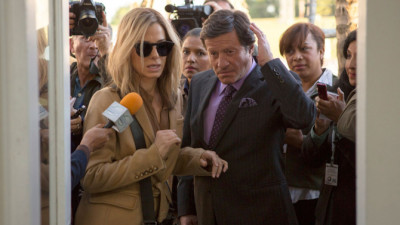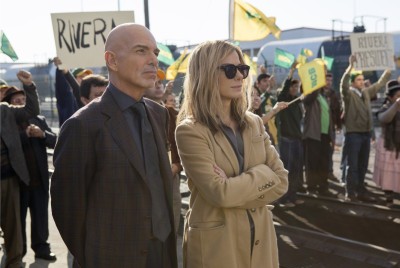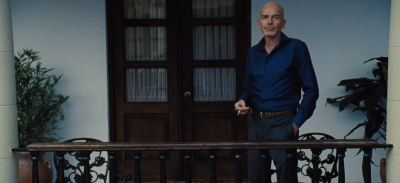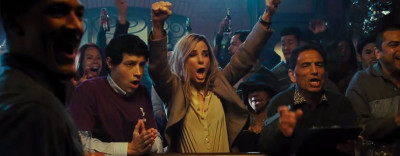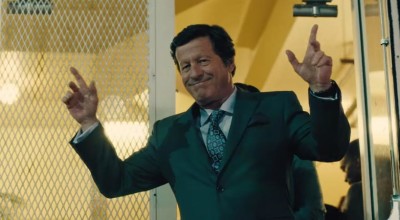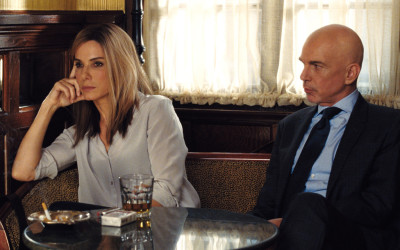“The more things change, the more they stay the same.” That statement is never truer than when it comes to politics, be it in the United States or elsewhere. As we have seen time and again with both narrative films and documentaries, election campaigning is a deadly, take-no-prisoners sport. The goal is always the same – winning – and the process typically means to win at any price no matter what tactics must be applied. But when you toss in the added layer of utilizing American marketing and advertising strategies, the process takes on a life of it own.
Timely and topical and in step with America’s current presidential campaign, leave it to the Smokehouse producing team of George Clooney and Grant Heslov, together with their co-conspirator Sandra Bullock, to serendipitously deliver “Our Brand Is Crisis” to the American public at the outset of our own 2016 campaign buffoonery. Suggested by Rachel Boynton’s 2005 documentary of the same name which showcased the 2002 Bolivian election and its employment of American political campaign marketing tactics, director David Gordon Green works with an intelligent, rapier-witted script from Peter Straughan that drips delicious satire, fictionalizing that 2002 Bolivian election. With Sandra Bullock and Billy Bob Thornton as opposing political strategists, the gloves are off and we are treated to a film that is nothing short of brilliant.
Jane Bodine could rule the world; that is if she wasn’t burnt out on life and reduced to a self-induced therapeutic state of hiding in the mountains away from the world and making pottery bowls upon pottery bowls. Jittery from too much coffee and severely nicotine deprived, not to mention being a little lax on her personal grooming, despite Jane’s constant profferings of “being fine and happy”, one can still see and feel her itch and the longing for the power and excitement that once being the greatest political strategist around gave her. So when campaign consultants Ben and Nell show up at her door, after much begging and pleading on their parts, Jane reluctantly agrees to head to Bolivia to work up the campaign of ex-president Castillo who is currently in fifth place with only 8% support of the voting public. If anyone can turn a sow’s ear into a silk purse, it’s Jane Bodine. But on her arrival, she gets the surprise of her life.
Turns out Ben and Nell forget to mention one little tidbit about the elections. The leading candidate, Rivera, has his own strategist – Pat Candy. Candy is nothing short of Jane’s arch nemesis and worst nightmare and has won every campaign in which the two have competed. With Candy in the mix the stakes go beyond mere election work. It’s personal.
Immediately faced with altitude sickness and with Castillo and his team less than impressed with Jane’s alleged skills, things aren’t looking too good for Jane, or Castillo. An observer who quietly takes in the world around her as it unfolds, it comes as a total surprise to all when Jane jumps into action as the floodgates of ideas opens wide for her. Quoting Sun Tzu as easily as she quotes Warren Beatty (although she seems to quote Beatty more) or Winston Churchill or rattles off political facts, figures and parables, Jane is indeed a force to be reckoned with; something that Pat Candy relishes with dastardly abandon.
A game of words and deeds with Bodine flipping negatives on their heads and turning them into positives, she hits on an inspired marketing strategy. Crisis. “Our Brand Is Crisis”. And with Candy and Bodine pulling out every political trick in the book and pushing ethical boundaries to check and checkmate at every turn, there is great truth to be found in the ensuing antics, as well as a crisis of conscience with some wondering just how far is too far.
While both Sandra Bullock’s Jane Bodine and Billy Bob Thornton’s character of Pat Candy are based on real life paid political consultant James Carville, Bodine is the “fictionalized” character, with Pat Candy being an incarnation of Carville in those 2002 elections. Both Thornton and Bullock are unstoppable in their performances, individually and when going toe-to-toe. The glee that each brings to their respective role is too delicious for words. And when it comes to satiric delivery, each is perfection. To achieve this “perfect storm” between them, according to both Thornton and Bullock, much stemmed from their long time off screen friendship. As Bullock explains, “What we did is we just allowed certain awkward and uncomfortable moments from obviously the demise of that relationship to seep into various moments that were pivotal to the script. We said, ‘Is this appropriate to allow in what happened when you did that really horrible thing to me that time into this moment and then remember when I got revenge and really f***ed you. Is that appropriate to bring in now?’ We found a good balance with that which I think kept it alive. Look, the sexual tension was just palpable. You can’t manufacture that. Either it is or it isn’t, and it was, and I think what you see is the end result of our power.”
Originally written for George Clooney, now seeing what Bullock brings to the table as Jane Bodine is indicative of what good producers Clooney and Heslov are. The level of smooth vitriol that Bullock injects into Jane, together with her patented physical comedic stylings (gotta have Sandra Bullock pratfalls!), adds layers and edges that Clooney could not have brought in a man versus man scenario. And being the ever gracious and astute producer that he is, Clooney stepped aside and Straughan rewrote the script for a female in the role. This is without a doubt not only one of the best performances of Bullock’s career, but one of the most intelligent and sizzling roles written for a woman in the last twenty years. Bodine is written with what at times feels like a nod to Katherine Hepburn and Bullock plays it brilliantly.
With what must be deemed an extension of his Carville-esque role in “Primary Colors” (not to mention being based on James Carville himself), as Pat Candy, Billy Bob Thornton oozes
snake-oil slickness, ratcheting up the gamesmanship and cynicism with devilish delight.
Always a joy to see on screen is Joaquim de Almeida and here as ex-president and presidential candidate Castillo is no different. De Almeida is perfection and the true embodiment of a “has been” seeking the limelight again. As Nell, Ann Dowd is a pillar of confidence while giving Nell shades of secrecy that adds to the texture of not only the character but the overall tapestry of the film. Anthony Mackie proves to be the moral compass and center of the film as Ben, grounding the story and holding true to the story origins.
But the real surprise of “Our Brand Is Crisis” is newcomer Reynaldo Pacheco. As young Castillo campaign worker, Eddie, Pacheco is pure wide eyed, unjaded, heart. He grounds us with hope and the power of idealism. As related by Green, “We did some substantial outreach trying to find the perfect Eddie. In a lot of ways, he’s the heart and soul of the movie and a pivot point for Jane Bodine’s character. And so, he represented a lot. It was the one substantial role that I felt needed to be Bolivian, and when I met Reynaldo, he had that energy and that innocence. There’s something about Eddie that’s very optimistic to the point of being naïve, to the point of being frustrating sometimes. I think Reynaldo is very savvy and educated and knew how to navigate some of those difficulty detours and was able to use those looks in the eyes and those little moments and those slivers of a smile that can transform someone that’s in that difficult position that Jane is in.” Bullock is equally enthusiastic about her co-star. “As smart and sharp and savvy as he might be, he did possess still the remnants of innocence. . .He hasn’t allowed life to chip away at that beautiful hopefulness, and that was needed. You don’t get that in a lot of actors, because we all come in and it’s a game and that gets lost very quickly. But he had that and that’s what you see. That’s why you could hang so much of the movie on his moments of loss and grief, and you feel it because he is, to a certain degree, a lot of the character.”
Directed by David Gordon Green and written by Peter Straughan, “Our Brand Is Crisis” is, in a word, brilliant. With a sense of “Wag the Dog” meets “Primary Colors” meets “Speechless” meets “Mr. Smith Goes to Washington”, this film has it all. The film walks the rapier line of satire, sarcasm and commentary, finding that sweet spot perfect balance of emotion and story. Political commentary is succinct and spot on showing the global interconnection/dependency/similarity of all countries and democratic systems. Significant is that script is so well structured that “Our Brand Is Crisis” evolves into a thoughtful and revelatory “Crisis of Conscience”.
Standout, however, is the satire and emotion. The writing, the direction, the performances – any one or a combination thereof could have been so far left or so far right or gone off the rails completely, but that doesn’t happen here. According to Heslov, the credit goes to Straughan. “He captured the tone that we had hoped for and had talked about. Then the rest was due to the actors. . .It is really a tribute to them.”
For director Green, it is a combination of things that came into play to achieve that even tonal bandwidth. “When you look at every cast member of the movie, they are incredibly dramatically and comedically capable, and the environment of making the movie was very playful. . .When there’s that kind of positivity you’re inclined to have as much fun as possible and push the comedic buttons and play with the wit and exaggerate that to some degree. And with that script we had a great foundation for all that. Then it’s a matter of trying to find the strength and heart. We did takes that were outrageous and ridiculous [like Bullock in character mooning Thornton’s Candy out a bus window] . . .But then you get into the editing room and you really start to sculpt and try to find just how far you can go without losing the foundation of emotion that I felt was very important. So it becomes the collaboration of sitting in the room and trying things out and putting it in front of audiences and see how people respond; and [wondering] can you get away with a llama getting hit by a car. . .It is the kind of thing where we film a lot. We roll and we try it. It’s a very bold cast that are fearless. We trust each other and we challenge each other. And we figure it out later. ”
As a side note, George Clooney was adamant on noting, “No llamas were hurt in the making of this movie. I just want to clarify.” And as for Bullock’s buttocks? Per Bullock herself, “If my [butt] looks good, then yes, it’s mine. If it doesn’t, it’s a butt double.]
As the film itself notes, “In politics, perception matters.” Same goes for movies. The perception on seeing “Our Brand Is Crisis” is brilliance.
Directed by David Gordon Green
Written by Peter Straughan
Cast: Sandra Bullock, Billy Bob Thornton, Anthony Mackie, Ann Dowd, Scoot McNairy

